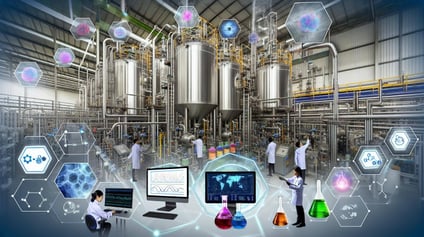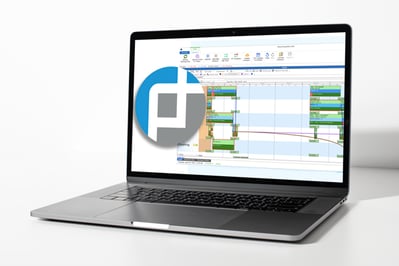Edge Computing for Enhanced Efficiency
The integration of cutting-edge technologies has become imperative for staying competitive and ensuring operational excellence in chemical manufacturing. Among these technologies, the Industrial Internet of Things (IIoT) has emerged as a game-changer, offering unprecedented opportunities for optimization and automation. Within the realm of IIoT, edge computing has gained significant traction, particularly in industries like chemical manufacturing, where real-time data processing and decision-making are crucial.
As a Purchasing Manager in a Chemical manufacturing facility, it's essential to understand the potential of edge computing in optimizing processes, enhancing efficiency, and ultimately, driving profitability.
In this blog, we'll look into the concept of edge computing, its applications in industrial IoT, and its integration with leading Enterprise Resource Planning (ERP), Supply Chain Management (SCM), and Manufacturing Execution Systems (MES) like SAP, Oracle, Microsoft, Kinaxis, Aveva, and others.

Edge Computing
At its core, edge computing involves processing data closer to the source of generation, i.e., at the "edge" of the network, rather than relying solely on centralized data processing centers. This decentralized approach offers several advantages, especially in industrial settings where real-time responsiveness is critical.
Key Benefits of Edge Computing
Reduced latency: By processing data locally, edge computing minimizes the time it takes for data to travel from sensors and devices to the central processing unit, thus enabling quicker response times.
Bandwidth optimization: Edge computing helps in reducing the volume of data transmitted to central servers, thereby optimizing network bandwidth and reducing operational costs.
Enhanced reliability: Decentralized processing ensures that critical operations can continue even in the event of network disruptions or latency issues.
Improved security: Edge computing can enhance data security by minimizing the need to transmit sensitive information over long distances, reducing the risk of interception or cyber threats.

Applications of Edge Computing in Chemical Manufacturing
Now, let's explore how edge computing can revolutionize various aspects of chemical manufacturing operations:
Real-time Monitoring and Predictive Maintenance: In chemical manufacturing plants, the condition of equipment and machinery is paramount. By deploying edge computing-enabled sensors and devices, manufacturers can continuously monitor equipment performance in real-time. Integrated with predictive maintenance algorithms, edge devices can analyze data patterns to anticipate potential failures before they occur, thereby minimizing downtime and optimizing asset utilization.
Process Optimization and Control: Edge computing empowers manufacturers to implement advanced process control strategies by processing data locally and making instantaneous adjustments. For instance, in batch processing operations, edge devices can monitor parameters such as temperature, pressure, and chemical composition in real-time, enabling precise control and optimization of production processes.
Quality Control and Compliance: Maintaining product quality and ensuring regulatory compliance are top priorities in chemical manufacturing. Edge computing facilitates real-time analysis of production data, allowing manufacturers to identify deviations from quality standards promptly. By integrating with ERP systems like SAP or Oracle, edge devices can automate quality control processes and trigger corrective actions to rectify issues before they escalate.
Supply Chain Optimization: Edge computing plays a crucial role in optimizing supply chain operations by providing real-time visibility into inventory levels, demand forecasts, and logistics data. Integrated with SCM systems such as Kinaxis, edge devices can enable proactive inventory management, dynamic routing optimization, and demand-driven production scheduling, thereby reducing lead times and enhancing supply chain resilience.

Integration with ERP, SCM, and MES Systems
One of the key challenges in implementing edge computing solutions lies in seamless integration with existing ERP, SCM, and MES systems. Fortunately, leading software providers like SAP, Oracle, Microsoft, Kinaxis, Aveva, and others have recognized the importance of interoperability and have developed integration frameworks to facilitate seamless data exchange between edge devices and central enterprise systems.
Integration with SAP: SAP offers solutions like SAP Leonardo IoT, which enable seamless integration between edge computing devices and SAP's suite of ERP, SCM, and MES applications. This integration allows manufacturers to leverage real-time data insights for optimizing business processes, enhancing decision-making, and driving innovation.
Integration with Oracle: Oracle provides edge computing solutions that seamlessly integrate with its ERP and SCM platforms, enabling manufacturers to leverage real-time data analytics for supply chain optimization, predictive maintenance, and quality management. The integration between Oracle's edge computing framework and MES systems enhances operational efficiency by enabling end-to-end visibility and control over manufacturing processes.
Integration with Microsoft Azure: Microsoft Azure IoT Edge offers robust integration capabilities, allowing manufacturers to deploy edge computing solutions across their facilities and seamlessly integrate with Microsoft's suite of ERP and SCM applications. By leveraging Azure's advanced analytics and machine learning capabilities, manufacturers can unlock new insights from edge data to drive continuous improvement and innovation.
Integration with Kinaxis: Kinaxis offers cloud-based SCM solutions that seamlessly integrate with edge computing devices, enabling manufacturers to optimize supply chain planning, demand forecasting, and inventory management in real-time. By leveraging Kinaxis' RapidResponse platform, manufacturers can achieve end-to-end visibility and agility across their supply chain networks, driving operational excellence and customer satisfaction.
Integration with Aveva: Aveva's comprehensive portfolio of industrial software solutions includes MES and asset performance management (APM) platforms that seamlessly integrate with edge computing devices. By combining real-time data from the edge with Aveva's MES and APM applications, manufacturers can improve asset reliability, optimize production efficiency, and ensure regulatory compliance.

Integration with PlanetTogether
In addition to the leading ERP, SCM, and MES systems mentioned earlier, it's essential to highlight the integration of edge computing solutions with specialized production planning and scheduling software like PlanetTogether. PlanetTogether offers advanced production planning and scheduling capabilities that are critical for optimizing manufacturing operations in industries like chemical manufacturing, where complex production processes and stringent scheduling requirements are common.
By integrating edge computing with PlanetTogether's scheduling software, chemical manufacturers can achieve the following benefits:
Real-time Production Scheduling: Edge computing enables real-time data processing and analysis at the edge of the network, allowing manufacturers to capture production data instantaneously and feed it directly into PlanetTogether's scheduling algorithms. This integration ensures that production schedules are continuously updated based on the latest operational data, enabling agile and adaptive scheduling decisions.
Dynamic Resource Allocation: With edge computing-enabled sensors and devices deployed throughout the manufacturing facility, manufacturers can gather real-time data on equipment utilization, material availability, and workforce productivity. By integrating this data with PlanetTogether's scheduling software, manufacturers can dynamically allocate resources, such as machines, raw materials, and labor, to optimize production efficiency and minimize bottlenecks.
Just-in-Time Production: Edge computing enables manufacturers to implement just-in-time production strategies by providing real-time visibility into inventory levels, production progress, and customer demand. Integrated with PlanetTogether's scheduling software, edge devices can trigger automatic replenishment orders, adjust production schedules dynamically, and optimize production sequences to meet customer demand while minimizing inventory holding costs.
Predictive Scheduling and Optimization: Leveraging edge computing's predictive analytics capabilities, manufacturers can anticipate potential production issues, such as equipment failures, material shortages, or quality deviations, before they occur. By integrating predictive insights from edge devices with PlanetTogether's scheduling software, manufacturers can proactively adjust production schedules, allocate resources efficiently, and minimize disruptions, thereby optimizing overall production performance.
Edge computing holds immense potential for revolutionizing chemical manufacturing operations by enabling real-time data processing, decision-making, and automation at the edge of the network. By embracing edge computing technologies and integrating them with leading ERP, SCM, and MES systems such as SAP, Oracle, Microsoft, Kinaxis, Aveva, and others, chemical manufacturers can unlock new opportunities for optimization, differentiation, and sustainable growth in today's competitive market landscape.
The integration of edge computing with specialized production planning and scheduling software like PlanetTogether is essential for chemical manufacturers looking to stay competitive and drive operational excellence. By harnessing the power of edge computing to capture real-time production data and integrating it seamlessly with PlanetTogether's scheduling algorithms, manufacturers can achieve unparalleled agility, efficiency, and responsiveness in their manufacturing operations.
By investing in the right technology partnerships and fostering a culture of innovation and collaboration, you can position your organization for success in the digital age of manufacturing.
Are you ready to take your manufacturing operations to the next level? Contact us today to learn more about how PlanetTogether can help you achieve your goals and drive success in your industry.